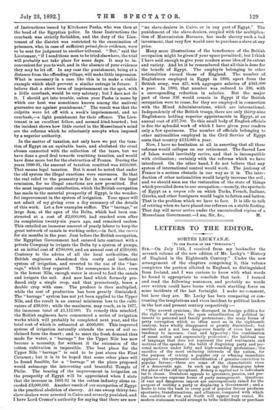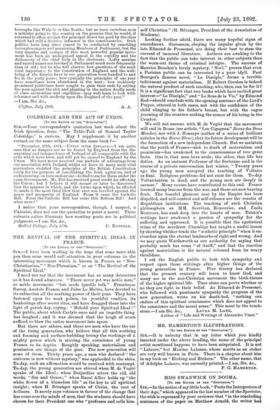LETTERS TO THE EDITOR.
SORTES LECK YAN.ZE.
ITo TER EDITOR OF TER " Bricveroa:1 SIR,—On July 15th, I received from my bookseller the seventh volume of the new edition of Mr. Lecky's " History of England in the Eighteenth Century." Under the new arrangement of the chapters comprising it, this volume completes the portion allotted to England, as distinguished from Ireland, and I was curious to know with what words he found it appropriate to conclude that task. I turned and read the following sentences, and probably no words ever written could have borne with such startling force on some incidents of the last fortnight. I make no comment, but here they are. Mr. Lecky has been comparing or con- trasting the temptations and vices incident to political leaders in the last and present century respectively :— " The avowed cynicism; the disregard in foreign politics for the rights of nations ; the open subordination of political in- terests to personal and family pretensions ; the many forms of petty corruption which so often meet us in the eighteenth century, have wholly disappeared or greatly diminished ; but another and a not less dangerous family of vices has much tendency to increase. Cant and hypocrisy ; the combination of mean action and supersaintly profession ; the habitual use of language that does not represent the real sentiments and motives of the speaker ; the habit of disguising party and per- sonal motives under lofty and high-sounding professions ; the sacrifice of the most enduring interests of the nation, for the purpose of raising a popular cry or winning immediate applause ; the systematic subordination cf genuine conviction to popular favour,—these are some of the characteristic vices of a democratic age. In such an age the demagogue takes the place of the old sycophant. Bribery is applied not to individuals but to classes. Dexterous appeals to ignorance, passion, and pre- judice become supreme forms of party management. Questions of vast and dangerous import are unscrupulously raised for the purpose of uniting a party or displacing a Government • and a desire to trim the bark to every gust of popular favour produces apostasies, transformations, and alliances, compared with which the coalition of Fox and North will appear very venial. No modern statesman would attempt to bribe individuals or purchase boroughs like Wa1plle or like North ; but we have ourselves seen a minister going to the country on the promise that he would, if returned to office, abolish the principal direct tax paid by the class which had still a decisive influence in the constituencies. Irish politics have long since ceased to be conducted by ennobling boroughmongers and pensioning Members of Parliament, but the very impulse and essence of this most powerful popular move- ment has been an undisguised appeal to the cupidity and the dishonesty of the chief body in the electorate. Lofty maxims and sacred names are invoked in Parliament much more frequently than of old ; but he who will observe how questions of the most vital importance to the Constitution of England and the well- being of the Empire have in our generation been bandied to and fro in the party game ; how cynically the principles of one year have sometimes been abandoned in the next ; how recklessly prominent politicians have sought to gain their ends by setting the poor against the rich and planting in the nation deadly seeds of class animosities and cupidities—may well learn to look with tolerance and with modesty upon the England of the past."
—I am, Sir, &c.,



































 Previous page
Previous page